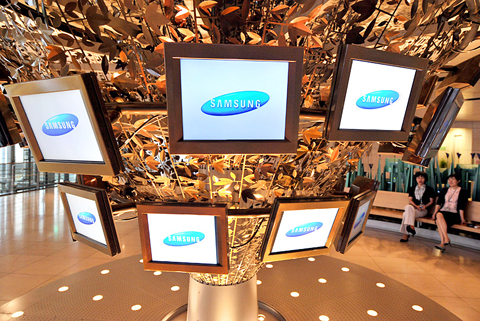Samsung Electronics, the world’s largest manufacturer of flat screen televisions, memory chips and liquid crystal displays, posted its first ever quarterly loss yesterday as the global economic slump hit prices and demand for mainstay products.
Samsung lost 20 billion won (US$14.37 million) in the three months ended on Dec. 31, the company said in a statement. Samsung posted 2.21 trillion won in net profit a year earlier.
The net loss was Samsung’s first since the company began reporting results on a quarterly basis in 2000 and underlines the challenges facing electronics companies worldwide as major economies flounder in recession.

PHOTO: AFP
The Suwon, South Korea-based company has struggled with falling prices for chips and flat screens, as well as the waning consumer appetite that has hit other Asian electronics manufacturers including Japanese giant Sony Corp.
On Thursday, Sony projected its first annual loss in 14 years, while South Korea’s LG Electronics Inc reported a record quarterly net loss. Japan’s Panasonic Corp said earlier this month it would slash about US$1.5 billion from its planned investment in two new flat-screen TV plants and shut down unprofitable businesses.
The results showed that “our company could not escape the rapid decline in the global economy,” Samsung’s Robert Yi, vice president for investor relations, told a conference call.
The result wasn’t as bad as the net loss of 92.93 billion won forecast by an Associated Press survey of 10 analysts. But on an operating basis, the company racked up red ink to the tune of 940 billion won, much worse than the forecast of a loss of 319 billion won. That loss was also a first.
Operating earnings are seen as a direct indicator of core business performance, while net profit or loss also reflects taxes, dividends, asset sales and other items.
“The global economic slowdown had an adverse effect on consumer purchases of electronics goods in the fourth quarter, traditionally a strong period for electronics companies,” Samsung said in the release.
Fourth quarter sales rose to 18.45 trillion won from 17.48 trillion won the year before, but less than the 20 trillion won expected by analysts.
Samsung shares fell 3.5 percent to 445,000 won in afternoon trading. The company announced results less than one hour after the stock market opened.
On the bright side, Samsung said mobile phone sales rose to a record during the quarter despite a 5 percent contraction in the global market for handsets. The company is the world’s No. 2 mobile phone manufacturer.
Samsung announced a major restructuring last week, consolidating business operations into two divisions. This week the company said it had replaced most of the heads of its overseas regional headquarters.
It also announced the redeployment of more than 80 percent of the almost 1,400 employees at its Seoul headquarters.

The Ministry of Foreign Affairs (MOFA) yesterday said it is closely monitoring developments in Venezuela, and would continue to cooperate with democratic allies and work together for regional and global security, stability, and prosperity. The remarks came after the US on Saturday launched a series of airstrikes in Venezuela and kidnapped Venezuelan President Nicolas Maduro, who was later flown to New York along with his wife. The pair face US charges related to drug trafficking and alleged cooperation with gangs designated as terrorist organizations. Maduro has denied the allegations. The ministry said that it is closely monitoring the political and economic situation

Conflict with Taiwan could leave China with “massive economic disruption, catastrophic military losses, significant social unrest, and devastating sanctions,” a US think tank said in a report released on Monday. The German Marshall Fund released a report titled If China Attacks Taiwan: The Consequences for China of “Minor Conflict” and “Major War” Scenarios. The report details the “massive” economic, military, social and international costs to China in the event of a minor conflict or major war with Taiwan, estimating that the Chinese People’s Liberation Army (PLA) could sustain losses of more than half of its active-duty ground forces, including 100,000 troops. Understanding Chinese

UNRELENTING: China attempted cyberattacks on Taiwan’s critical infrastructure 2.63 million times per day last year, up from 1.23 million in 2023, the NSB said China’s cyberarmy has long engaged in cyberattacks against Taiwan’s critical infrastructure, employing diverse and evolving tactics, the National Security Bureau (NSB) said yesterday, adding that cyberattacks on critical energy infrastructure last year increased 10-fold compared with the previous year. The NSB yesterday released a report titled Analysis on China’s Cyber Threats to Taiwan’s Critical Infrastructure in 2025, outlining the number of cyberattacks, major tactics and hacker groups. Taiwan’s national intelligence community identified a large number of cybersecurity incidents last year, the bureau said in a statement. China’s cyberarmy last year launched an average of 2.63 million intrusion attempts per day targeting Taiwan’s critical

‘SLICING METHOD’: In the event of a blockade, the China Coast Guard would intercept Taiwanese ships while its navy would seek to deter foreign intervention China’s military drills around Taiwan this week signaled potential strategies to cut the nation off from energy supplies and foreign military assistance, a US think tank report said. The Chinese People’s Liberation Army (PLA) conducted what it called “Justice Mission 2025” exercises from Monday to Tuesday in five maritime zones and airspace around Taiwan, calling them a warning to “Taiwanese independence” forces. In a report released on Wednesday, the Institute for the Study of War said the exercises effectively simulated blocking shipping routes to major port cities, including Kaohsiung, Keelung and Hualien. Taiwan would be highly vulnerable under such a blockade, because it